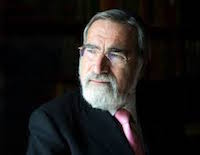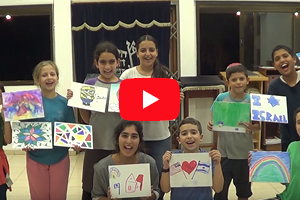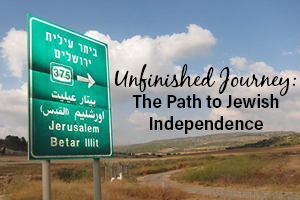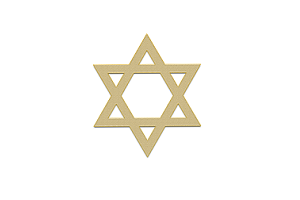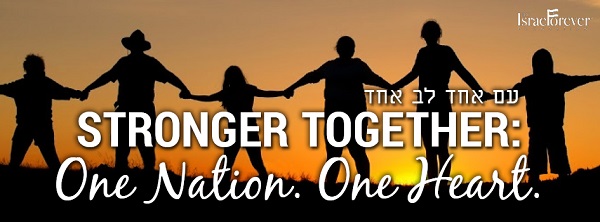The Power of Empathy | Parashat Mishpatim
By Rabbi Lord Jonathan Sacks, Z"L
William Ury, founder of the Harvard Program of Negotiation, tells a marvelous story in one of his books. A young American, living in Japan to study aikido, was sitting one afternoon in a train in the suburbs of Tokyo. The carriage was half empty. There were some mothers with children, and elderly people going shopping.
Then at one of the stations, the doors opened, and a man staggered into the carriage, shouting, drunk, dirty, and aggressive. He started cursing the people, and lunged at a woman holding a baby. The blow hit her and sent her into the lap of an elderly couple. They jumped up and ran to the other end of the carriage. This angered the drunk, who went after them, grabbing a metal pole and trying to wrench it out of its socket. It was a dangerous situation, and the young student readied himself for a fight.
Before he could do so, however, a small, elderly man in his seventies, dressed in a kimono, shouted “Hey” to the drunk in a friendly manner. “Come here and talk to me.” The drunk came over, as if in a trance. “Why should I talk to you?” he said. “What have you been drinking?” asked the old man. “Sake,” he said, “and it’s none of your business!”
“Oh that’s wonderful,” said the old man. “You see, I love sake too. Every night, me and my wife (she’s 76, you know), we warm up a little bottle of sake and take it out into the garden and we sit on an old wooden bench. We watch the sun go down, and we look to see how our persimmon tree is doing. My great-grandfather planted that tree …”
As he continued talking, gradually the drunk’s face began to soften and his fists slowly unclenched. “Yes,” he said, “I love persimmons too.” “And I’m sure,” said the old man, smiling, “you have a wonderful wife.”
“No,” replied the drunk. “My wife died.” Gently, he began to sob. “I don’t got no wife. I don’t got no home. I don’t got no job. I’m so ashamed of myself.” Tears rolled down his cheeks.
As the train arrived at the student’s stop and he was leaving the train, he heard the old man sighing sympathetically, “My, my. This is a difficult predicament indeed. Sit down here and tell me about it.” In the last glimpse he saw of them, the drunk was sitting with his head in the old man’s lap. The man was softly stroking his hair.
What he had sought to achieve by muscle, the old man had achieved with kind words.
A story like this illustrates the power of empathy, of seeing the world through someone else’s eyes, entering into their feelings, and of acting in such a way as to let them know that they are understood, that they are heard, that they matter.
If there is one command above all others that speaks of the power and significance of empathy it is the line in this week’s parsha: “You shall not oppress a stranger, for you know the heart of a stranger: You were strangers in the land of Egypt” (Ex. 23:9).
Why this command? The need for empathy surely extends way beyond strangers. It applies to marriage partners, parents and children, neighbours, colleagues at work and so on. Empathy is essential to human interaction generally. Why then invoke it specifically about strangers?
The answer is that “empathy is strongest in groups where people identify with each other: family, friends, clubs, gangs, religions or races.” The corollary to this is that the stronger the bond within the group, the sharper the suspicion and fear of those outside the group. It is easy to “love your neighbour as yourself.” It is very hard indeed to love, or even feel empathy for, a stranger. As primatologist Frans de Waal puts it:
We’ve evolved to hate our enemies, to ignore people we barely know, and to distrust anybody who doesn’t look like us. Even if we are largely cooperative within our communities, we become almost a different animal in our treatment of strangers.
Fear of the one-not-like-us is capable of disabling the empathy response. That is why this specific command is so life-changing. Not only does it tell us to empathize with the stranger because you know what it feels like to be in his or her place. It even hints that this was part of the purpose of the Israelites’ exile in Egypt in the first place. It is as if God had said, your sufferings have taught you something of immense importance. You have been oppressed; therefore come to the rescue of the oppressed, whoever they are. You have suffered; therefore you shall become the people who are there to offer help when others are suffering.
And so it has proved to be.
There were Jews helping Gandhi in his struggle for Indian independence; Martin Luther King in his efforts for civil rights for African Americans; Nelson Mandela in his campaign to end apartheid in South Africa. An Israeli medical team is usually one of the first to arrive whenever and wherever there is a natural disaster today.
The religious response to suffering is to use it to enter into the mindset of others who suffer. That is why I found so often that it was the Holocaust survivors in our community who identified most strongly with the victims of ethnic war in Bosnia, Rwanda, Kosovo and Darfur.
I have argued, in Not in God’s Name, that empathy is structured into the way the Torah tells certain stories – about Hagar and Ishmael when they are sent away into the desert, about Esau when he enters his father’s presence to receive his blessing only to find that Jacob has taken it, and about Leah’s feelings when she realizes that Jacob loves Rachel more. These stories force us into recognizing the humanity of the other, the seemingly unloved, unchosen, rejected.

Indeed, it may be that this is why the Torah tells us these stories in the first place. The Torah is essentially a book of law. Why then contain narrative at all? Because law without empathy equals justice without compassion. Rashi tells us that “Originally God planned to create the world through the attribute of justice but saw that it could not survive on that basis alone. Therefore He prefaced it with the attribute of compassion, joined with that of justice.” That is how God acts and how He wants us to act. Narrative is the most powerful way in which we enter imaginatively into the inner world of other people.
Empathy is not a lightweight, touchy-feely, add-on extra to the moral life. It is an essential element in conflict resolution. People who have suffered pain often respond by inflicting pain on others. The result is violence, sometimes emotional, sometimes physical, at times directed against individuals, at others, against whole groups. The only genuine, non-violent alternative is to enter into the pain of the other in such a way as to ensure that the other knows that he, she or they have been understood, their humanity recognized and their dignity affirmed.
Not everyone can do what the elderly Japanese man did, and certainly not everyone should try disarming a potentially dangerous individual that way. But active empathy is life-changing, not only for you but for the people with whom you interact. Instead of responding with anger to someone else’s anger, try to understand where the anger might be coming from. In general, if you seek to change anyone’s behaviour, you have to enter into their mindset, see the world through their eyes and try to feel what they are feeling, and then say the word or do the deed that speaks to their emotions, not yours. It’s not easy. Very few people do this. Those who do, change the world.
Originally published here
FOOD FOR THOUGHT
- In today’s world most people seem addicted to outrage and the adrenalin rush that comes with being outraged. What would happen if instead of reacting with anger, we reacted to situations as did the old man in the story?
- The power of empathy speaks strongly to us. Jews famously work to assist others in our own community and to stand with the oppressed when fighting injustice because we feel the pain of the other. But what about the law? The Torah is a guideline of life laws – what happens when we want to live with empathy (feelings) but without paying regard to law (justice)?
- Considering that it is historically very common for the Jewish people to empathize with other oppressed people, why do so few empathize with Jews? Does it have to do with the way we are trained as children, the morals and the values we uphold?
- Rabbi Sacks says: “If you seek to change anyone’s behaviour, you have to enter into their mindset, see the world through their eyes and try to feel what they are feeling, and then say the word or do the deed that speaks to their emotions, not yours.”
- This principle works wonderfully when dealing with people who are similar to us and have value systems we can understand. What happens when we are dealing with people who come from a very different culture than ours?
- Many people have attempted to resolve the Arab-Israeli conflict through the principle of empathy however did they really look through the lens of Arab perspective or were they looking through the perspective of Westerners?
- Over and over people have attempted to apply this to the Arab-Israeli peace process and yet have they really? When we consider the Arabs who fight against Israel’s existence and “see the world through their eyes and try to feel what they are feeling”- Empathy is an excellent quality but the Talmud also instructs: “The poor of your own city come first.” What happens when people have so much empathy for the stranger that they forget to address the needs of the poor, weak or oppressed nearby?
Recommended for you:
About the Author
